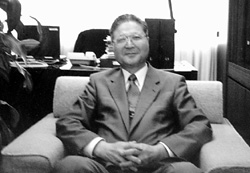Japanese Miracle from Inside

He saw all Japanese technological
achievements and asked,
“How many years does
the USSR lag behind Japan?”
(Continued from page DAY AFTER DAY)
Japanese quality has for many years been the highest appraisal of technological achievements in various fields of production. Meanwhile, few of us pondered in Soviet times on why a country so small by our standards, devoid of its own energy resources (even today Japan imports over 90% of oil), and a country that lost World War II, has not only outdone the winners but also become one of the world economic leaders. And even if we did think about it, we had a ready clichEО: the Japanese miracle. And a miracle, as any thing irrational, is not subject to explanation.
It is to comprehend this miracle that I went to see Mr. Sawama, vice president of the Japanese Socioeconomic Productive Development Center. The center is a private organization, although established by decision of the Japanese Cabinet.
“After World War II our country’s economy in fact lay in ruins,” Mr. Sawama said, “To restore it, a plan was drawn up, similar to the Marshall Plan implemented in Germany. Millions of the unemployed were to be given jobs. Japanese goods were scarce, and they were of very poor quality (a painfully familiar situation, as if we deal with the Ukraine of 1999 and not postwar Japan —Author). To revive the economy, it was necessary first of all to increase labor productivity and product quality. It is for this purpose that our center composed of trade union leaders, businessmen, and scientists was set up.”
“Do any disputes arise between businessmen and trade unions?”
“At first they did occur and were quite sharp. The trade unions were very aggressive for some time, and it took considerable effort to convince them that it was not yet the time to divide up the pie. In fact, there was no pie, it still had to be cooked. At that time, our center worked out the basic principles of its work: 1. Joint efforts by trade unions and employers, 2. To increase the number of jobs along with the development of the industrial sector, and 3. Dividing the pie equitably: not only the profits of entrepreneurs but also wages should rise.
“But I must stress that all these principles can only work under conditions of a fair and government-guaranteed cooperation between business and trade unions.”
“What did the Japanese miracle start with?”
“In the postwar world, the US possessed the most advanced technologies, so we sent delegations to the US to study American experience. Money for these programs was allocated by the governments of Japan and the US. Japanese firms worked under the motto...”
When the motto was translated for me, I did not believe it and asked to explain it more in detail. The interpreter specified it and said again: “To work today better than yesterday, and tomorrow better than today.”
“Wait,” I exclaimed, “but the same slogan, word for word, used to hang in almost all Soviet enterprises!”
“Did Japan follow the practice of supporting the domestic producer? There is quite a heated debate on this in Ukraine.”
“Yes, the government granted Japanese enterprises various privileges, and a duty was levied on imports. But all these measures can work only if there is competition among producers. Otherwise, this support leads not to economic development but, to the contrary, to industrial slump.”
“How is your center financed?”
“Only private firms invest money. There are 300 employees today in the center, which works on a self-financing basis. Japanese entrepreneurs understood long ago the simple principle that whoever wants to make a profit must first invest money in the organization of production, training of workers, and utilization of up-to-date technologies. We offer assistance in these matters: for example, we organize refresher courses. In addition, businessmen themselves organize competitions, and the winners have been awarded the Quality Prize in the past three years. Moreover, results are assessed from the consumer’s standpoint.”
Efficiency improvement proposals, refresher courses, and competition are all well known from our socialist past. However, it turns out that the same slogans and measures have worked differently under different political systems: in a country with collective ownership they degenerated into universal negligence and became the butt of jokes, while in a country with private property they became the foundation for economic development.
But so much for comparison with the USSR. For as long as eight years of Ukrainian independence have we been declaring that private property is equal in rights with that owned by the state, for eight years have been talking about economic reforms and the development of small and medium business. And although there has been no war since 1991, and we still have technical specialists excellently trained in Soviet institutions of higher learning, this country still faces industrial slump and a growing social tension. This resulted in reforms becoming a curse word and nostalgia for the Soviet past growing more and more in society, which the Communists exploit.
I offer two possible conclusions:
1. The Ukrainian people, unlike the Japanese, are stupid, lazy, and hence incapable of working well and effectively (to which I personally do not agree).
2. Economic reforms are not being carried out in earnest.
Everybody can accept or reject these two conclusions. But I am personally convinced that if every resident of Ukraine could come to Japan at least for a day, we would finally stop searching for our own special historical way of development and talking about socialism with a human face, while the population would demand that the authorities either fulfill their duties properly or resign. Then, some time later, we could speak seriously about the Ukrainian economic miracle.
The Day expresses gratitude to the Japanese Ministry of Foreign Affairs, the Japanese Embassy in Ukraine, and the Ambassador personally, for organizing this trip
Newspaper output №: Section






